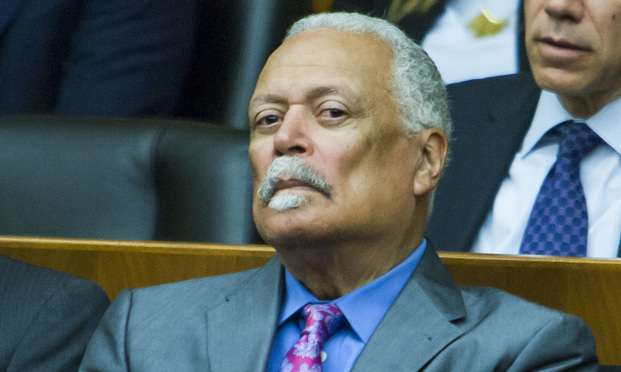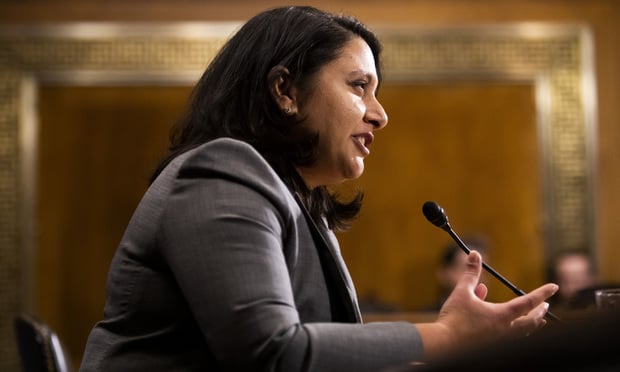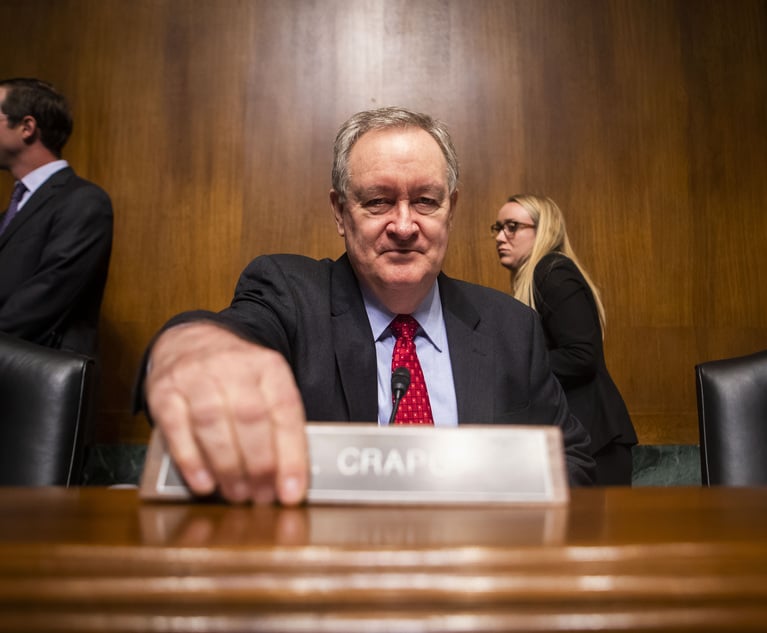Judge Emmet Sullivan Contests DC Circuit Decision Ordering Dismissal of Flynn Case
"The panel's decision threatens to turn ordinary judicial process upside down," veteran trial lawyer Beth Wilkinson, representing U.S. District Judge Emmet Sullivan, said in Thursday's petition for a full-court rehearing.
July 09, 2020 at 04:02 PM
6 minute read
 U.S. District Judge Emmet Sullivan of the District of Columbia, during the court's Reentry Court Inauguration Ceremony. June 6, 2016. Photo: Diego M. Radzinschi/ALM
U.S. District Judge Emmet Sullivan of the District of Columbia, during the court's Reentry Court Inauguration Ceremony. June 6, 2016. Photo: Diego M. Radzinschi/ALM
A federal judge in Washington pushed back Thursday against an appeals court decision ordering the immediate dismissal of the Michael Flynn prosecution, arguing that he should be allowed to proceed with a review of the Justice Department's extraordinary retreat from the case against the former Trump national security adviser.
Last month, a divided three-judge panel of the U.S. Court of Appeals for the D.C. Circuit ordered U.S. District Judge Emmet Sullivan of the District of Columbia to dismiss the case at the Justice Department's request, despite Flynn's past admissions that he lied to the FBI about his contacts with the Russian ambassador to the U.S.
Writing for the 2-1 panel, Judge Neomi Rao, the latest Trump appointee to the D.C. Circuit, concluded that Sullivan had overstepped in taking up a review of the Justice Department's decision to drop the case.
In a 30-page court filing, Sullivan's lawyers on Thursday asked the full D.C. Circuit to take up the Flynn case and effectively erase the panel's split decision. Sullivan, represented by the prominent Washington lawyer Beth Wilkinson, argued the D.C. Circuit had prematurely intervened in the prosecution before the judge ruled on the Justice Department's motion to dismiss the case.
"The panel's decision threatens to turn ordinary judicial process upside down. It is the district court's job to consider and rule on pending motions, even ones that seem straightforward," Wilkinson wrote. She added that the D.C. Circuit, "if called upon, reviews those decisions—it does not preempt them."
 Beth Wilkinson of Wilkinson Walsh.
Beth Wilkinson of Wilkinson Walsh.The D.C. Circuit likely now will ask Flynn's lawyers and perhaps the Justice Department, too, to respond to the petition from Sullivan. Any order by the full D.C. Circuit to rehear the case would void the panel decision.
Rather than readily dismiss the Flynn case, Sullivan appointed a former judge, John Gleeson, to oppose the Justice Department's move to drop the case and address whether contempt proceedings were warranted against Flynn. Gleeson, now a partner at the law firm Debevoise & Plimpton, said Sullivan should proceed with sentencing Flynn on his guilty plea.
Sullivan had also set a July 16 hearing on the Justice Department's bid to drop the Flynn case, but he canceled the proceeding after the D.C. Circuit panel ordered him to dismiss the prosecution.
In that panel ruling, Rao said Sullivan's inquiry into the unusual retreat from the prosecution was not "warranted."
"To begin with," she wrote, "Flynn agrees with the government's motion to dismiss, and there has been no allegation that the motion reflects prosecutorial harassment."
 Neomi Rao testifies before the Senate Judiciary Committee. Photo: Diego M. Radzinschi / NLJ
Neomi Rao testifies before the Senate Judiciary Committee. Photo: Diego M. Radzinschi / NLJThe ruling was widely lambasted as an overreach that restricts the power of courts to question the executive branch. Prosecutors cannot dismiss a case on their own. They need permission—"leave of court," according to federal rules.
"The panel's decision is plainly wrong and the en banc court of appeals will almost certainly reversed it if the case reaches that stage," Georgetown law professor Marty Lederman said in a post on the blog Just Security. "But it now stands as the law of the D.C. Circuit, and everyone who cares about the state of the federal courts should take notice."
J. Michael Luttig, a prominent former conservative federal appeals, asserted that the D.C. Circuit had answered the wrong question, improperly framing the dispute in the view of the potential harm on the government, which did not bring the appeal, rather than the alleged harm on Flynn.
"Knowingly or not, the Court of Appeals simply appears to have bungled perhaps the most consequential political constitutional case in recent memory," Luttig wrote in an op-ed at The New York Times. He called the panel decision "grievously wrong" and "ill reasoned." Still, he said, the court "reached the result that almost certainly will be required by law."
In 2017, Flynn agreed to cooperate with the Russia investigation as part of a plea deal in which he admitted to lying to the FBI about his phone calls with the Russian ambassador to the U.S. in the buildup to Trump's inauguration. In recent months, Flynn waged a campaign to back out of that plea deal, and just weeks ago the Justice Department asked Sullivan to dismiss the case.
The Justice Department's move to drop the Flynn case, combined with Sullivan's reluctance to dismiss the prosecution, has set up an extraordinary clash between the courts and the executive branch. It has raised novel questions about the scope of a judge's authority to review decisions made in the course of a criminal prosecution and fueled fresh scrutiny of U.S. Attorney General William Barr intervening in case to the benefit of Trump allies.
"The government has engaged in highly irregular conduct to benefit a political ally of the president. The facts of this case overcome the presumption of regularity," Gleeson wrote in his 82-page friend-of-the-court brief. "The court should therefore deny the government's motion to dismiss, adjudicate any remaining motions, and then sentence the defendant."
The Justice Department's move to abandon the case was a "gross abuse of prosecutorial power," Gleeson said.
Rao was joined by Judge Karen LeCraft Henderson, who did not offer any individual view in the panel ruling. When the case was argued, however, Henderson expressed support for the idea that Sullivan could be allowed to hold a hearing to weigh whether or not to dismiss the Flynn prosecution.
Judge Robert Wilkins, writing in dissent, called Rao's decision a "trailblazing result."
"It is a great irony that, in finding the District Court to have exceeded its jurisdiction, this Court so grievously oversteps its own," he wrote.
Read more:
Divided DC Circuit Orders Judge to Dismiss Flynn Case at Trump DOJ's Request
Michael Flynn Should Be Sentenced for Lying to FBI, Court-Appointed Amicus Tells Judge
Don't 'Short-Circuit' Flynn Proceedings, Judge Emmet Sullivan Tells DC Circuit
24 Former Federal Judges Support Emmet Sullivan in Flynn's DC Circuit Challenge
Flynn Judge Emmet Sullivan Hires Veteran Trial Lawyer Beth Wilkinson
Barr's Move to Drop Flynn Case Puts Spotlight on 1977 US Supreme Court Ruling
This content has been archived. It is available through our partners, LexisNexis® and Bloomberg Law.
To view this content, please continue to their sites.
Not a Lexis Subscriber?
Subscribe Now
Not a Bloomberg Law Subscriber?
Subscribe Now
NOT FOR REPRINT
© 2025 ALM Global, LLC, All Rights Reserved. Request academic re-use from www.copyright.com. All other uses, submit a request to [email protected]. For more information visit Asset & Logo Licensing.
You Might Like
View All
Who Are the Judges Assigned to Challenges to Trump’s Birthright Citizenship Order?

Senator Plans to Reintroduce Bill to Split 9th Circuit

'If the Job Is Better, You Get Better': Chief District Judge Discusses Overcoming Negative Perceptions

Fight Over Amicus-Funding Disclosure Surfaces in Google Play Appeal
Law Firms Mentioned
Trending Stories
- 1Donald Trump Serves Only De Facto and Not De Jure: A Status That Voids His Acts Usurping the Power of Congress or the Courts
- 2Georgia Hacker Pleads Guilty in SEC X Account Scam That Moved Markets
- 3Trump's Pick for SEC Chair Likely to Stymie Shareholder Proposals from ESG Advocates
- 4Adobe’s Chief Cyber Legal & Privacy Officer Talks Managing Gen AI Risks, Cyber Training
- 5The M&A Partners Who Drove the Most Business as Deal Leads Last Year
Who Got The Work
J. Brugh Lower of Gibbons has entered an appearance for industrial equipment supplier Devco Corporation in a pending trademark infringement lawsuit. The suit, accusing the defendant of selling knock-off Graco products, was filed Dec. 18 in New Jersey District Court by Rivkin Radler on behalf of Graco Inc. and Graco Minnesota. The case, assigned to U.S. District Judge Zahid N. Quraishi, is 3:24-cv-11294, Graco Inc. et al v. Devco Corporation.
Who Got The Work
Rebecca Maller-Stein and Kent A. Yalowitz of Arnold & Porter Kaye Scholer have entered their appearances for Hanaco Venture Capital and its executives, Lior Prosor and David Frankel, in a pending securities lawsuit. The action, filed on Dec. 24 in New York Southern District Court by Zell, Aron & Co. on behalf of Goldeneye Advisors, accuses the defendants of negligently and fraudulently managing the plaintiff's $1 million investment. The case, assigned to U.S. District Judge Vernon S. Broderick, is 1:24-cv-09918, Goldeneye Advisors, LLC v. Hanaco Venture Capital, Ltd. et al.
Who Got The Work
Attorneys from A&O Shearman has stepped in as defense counsel for Toronto-Dominion Bank and other defendants in a pending securities class action. The suit, filed Dec. 11 in New York Southern District Court by Bleichmar Fonti & Auld, accuses the defendants of concealing the bank's 'pervasive' deficiencies in regards to its compliance with the Bank Secrecy Act and the quality of its anti-money laundering controls. The case, assigned to U.S. District Judge Arun Subramanian, is 1:24-cv-09445, Gonzalez v. The Toronto-Dominion Bank et al.
Who Got The Work
Crown Castle International, a Pennsylvania company providing shared communications infrastructure, has turned to Luke D. Wolf of Gordon Rees Scully Mansukhani to fend off a pending breach-of-contract lawsuit. The court action, filed Nov. 25 in Michigan Eastern District Court by Hooper Hathaway PC on behalf of The Town Residences LLC, accuses Crown Castle of failing to transfer approximately $30,000 in utility payments from T-Mobile in breach of a roof-top lease and assignment agreement. The case, assigned to U.S. District Judge Susan K. Declercq, is 2:24-cv-13131, The Town Residences LLC v. T-Mobile US, Inc. et al.
Who Got The Work
Wilfred P. Coronato and Daniel M. Schwartz of McCarter & English have stepped in as defense counsel to Electrolux Home Products Inc. in a pending product liability lawsuit. The court action, filed Nov. 26 in New York Eastern District Court by Poulos Lopiccolo PC and Nagel Rice LLP on behalf of David Stern, alleges that the defendant's refrigerators’ drawers and shelving repeatedly break and fall apart within months after purchase. The case, assigned to U.S. District Judge Joan M. Azrack, is 2:24-cv-08204, Stern v. Electrolux Home Products, Inc.
Featured Firms
Law Offices of Gary Martin Hays & Associates, P.C.
(470) 294-1674
Law Offices of Mark E. Salomone
(857) 444-6468
Smith & Hassler
(713) 739-1250








